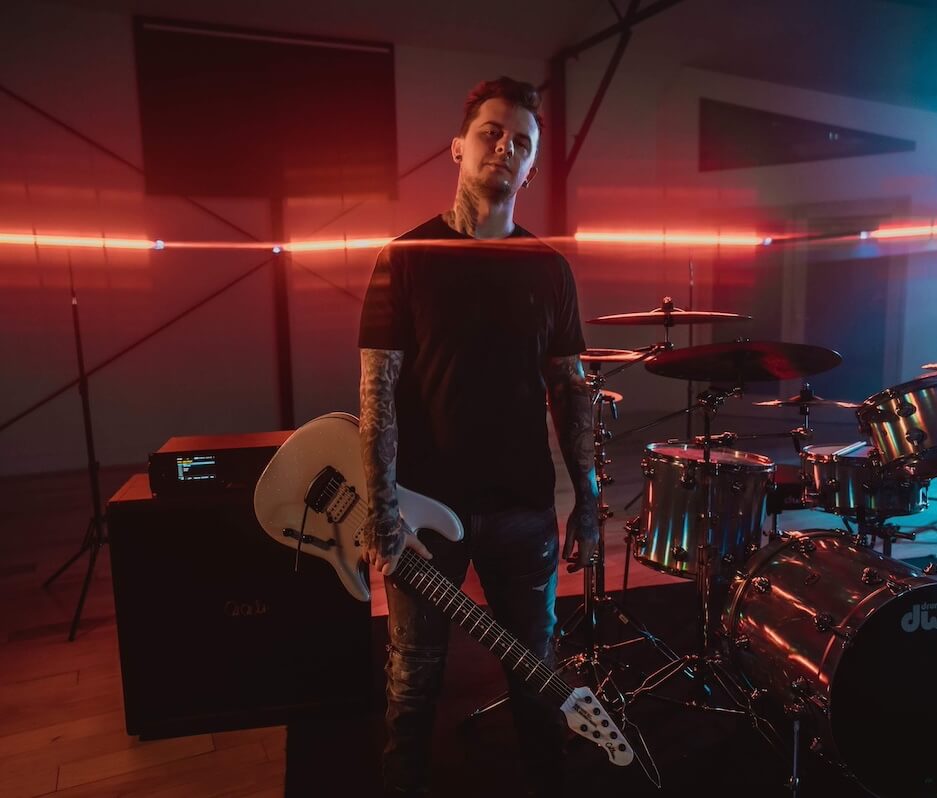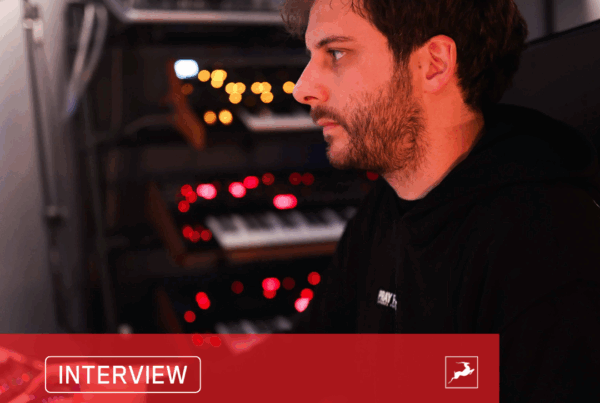From viral prodigy to one of modern metal’s most technically gifted guitarists, Jason Richardson has carved a path defined by precision, intensity, and evolution. In this exclusive interview, he reflects on his early inspirations, life-changing band experiences, and the creative freedom behind his solo work. Discover how Antelope Audio’s devices elevate his workflow, bringing unmatched clarity and depth to his ever-evolving sound.
Jason, you've been in the music industry since your teens. Could you share a bit about your early musical journey? How did growing up in a house full of instruments influence your career path?
It definitely shaped it! I wouldn’t be doing what I do today without that influence. I didn’t start taking guitar seriously until I was 12. Before that, I played piano, drums, and violin. Once I picked up the guitar, it just clicked, and I decided to put all my effort into it.
You’ve previously mentioned that the band Dream Theater was a huge inspiration for you, especially their “This Dying Soul.” What was it about this track or Dream Theater's style that resonated with you at a young age?
Drums were my main instrument when I discovered Dream Theater’s Train of Thought. My dad and I saw a video of Portnoy at Guitar Center, looked them up, and I ended up learning the whole album on drums. My dad later got me a guitar for Christmas when I was 12, and that’s when I shifted focus. I wanted to write my own songs. “This Dying Soul” was a huge motivator, especially the relentless shred at the end. I just wanted to play like that, so I put in the hours.

We know some bits and grits about your career breakthrough, and especially your connection with All Shall Perish. Could you tell us more about this time and how that experience shaped your approach to music and your later career?
I joined All Shall Perish through what was basically a MySpace wanted ad for a lead guitarist, lol. My dad helped me film playthroughs, and we sent them over. I wasn’t even 18 like they required, just 17. To my surprise, they replied within 12 hours! I ended up dropping out of high school that February to join.
You’ve played with All Shall Perish, Born of Osiris, Chelsea Grin, and All That Remains, to name a few. How have these transitions between bands impacted your musical evolution, and did you have any specific difficulties adapting to their unique styles?
With All Shall Perish, nothing was officially written before I left for BOO. Writing for BOO came naturally. I was already a fan, and we clicked creatively. The biggest challenge was keeping the label from ruining songs; only one of their ideas, for Follow the Signs, made it in.
Chelsea Grin was fun but more restrictive. I had to simplify ideas to fit their sound. I’m proud of EVOLVE and Ashes to Ashes, but when I presented an early version of Retrograde, they said it was too complicated. That was the breaking point, and I knew I needed to move on.
My solo album with Luke Holland let me finally unleash everything creatively. Writing for All That Remains has also been great. After learning Oli’s solos, it was easy to write in their style.

We’ve been huge fans of your debut solo album, “I.” Could you walk us through the process while preparing and recording it?
When I left Chelsea Grin, I already had about half the album written – Titan, Retrograde, Fragments, THOT 2.0, Breaking Damnation, and Tonga. During the self-funding campaign, I wrote OMNI, Hos Down, Mirrors, and XV/Chapter II, aiming for one full song a month. Recording took longer than I hoped due to outside factors, but it came out amazing. I’m really proud of it.
Your style on seven - and eight-string guitars has set a benchmark for technical proficiency. Could you break down your approach to these guitars and how they expand your melodic and rhythmic range compared to a six-string?
It started with This Dying Soul and my first 7-string – a John Petrucci Musicman I saved for over a year to buy. It became my main guitar, so writing on 7s just felt natural. My mindset was: why limit myself? The extra strings give more range in one spot, though I also appreciate how constraints like string count can force creative thinking.

Can you walk us through your typical recording setup from start to finish? How do your choices in guitar, preamps, converters, and audio interfaces impact the final sound?
I mainly use my signature Musicman guitars for everything except acoustic or classical parts. My Discrete 8 handles all my guitar and synth DIs, going DB25 out into my HDIO for Pro Tools. I love the warmth and clarity it gives before hitting the computer – it’s an integral part of my setup.
Jason, could you walk us through your typical studio session? How do you organize your workspace to maximize creativity and efficiency when recording?
Honestly, the best thing is leaving your phone in another room so you’re not distracted, lol. Everything in my studio is hooked up and ready at the push of a button, my four analog synths all run into the Discrete 8, and I can control them from my 88-key controller. I do a lot in MIDI, with a slave computer handling virtual instruments. Once I figured that setup out, it opened endless possibilities.

We know you’ve been working with our Discrete 8 interface. How does it fit into your setup, and what impact does it have on your projects?
It’s my main preamp and input for guitars and synths. Now that I have the Orion Studio, it’ll replace the Discrete 8, which I’ll move to my streaming setup for more flexibility. Understanding routing and your interface software is crucial! Once that clicked for me, everything changed.
Looking back on everything you've achieved so far, if you could go back to your teenage self just picking up a guitar for the first time, what advice would you give, not only about navigating within the music industry but also about the path ahead as a guitarist and creator?
For guitar, I’d tell myself to practice more improvisation and stay consistent. You never know when Joe Satriani might call you for a G3 jam last minute, or Lindsey Stirling might ask you to play a livestream in two days!
As for the industry, trust no one, verify everything. Learn how royalties work so you’re not chasing payments for years. The business can be toxic, and people you trust might still burn you. Don’t rush into deals, if it seems too good to be true, it probably is. But there are good people out there – find them and keep them close.
Socials:
Spotify – spotify.com/JasonRichardson
Instagram – instagram.com/jasonreevesrichardson
Youtube – youtube.com/@JasonRichardsonGuitar
Website – www.jasonrichardsonmusic.com





